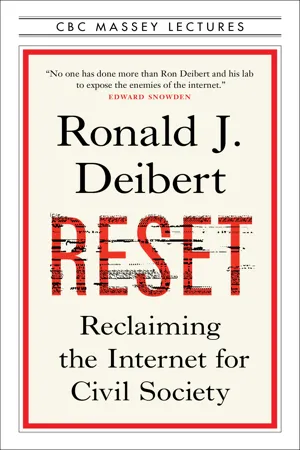Notes
Introduction
Right-wing, neo-fascist populism flourishes online and off, igniting hatred, murder, and even genocide: Venier, S. (2019). The role of Facebook in the persecution of the Rohingya minority in Myanmar: Issues of accountability under international law. Italian Yearbook of International Law Online, 28(1), 231–248; Vaidhyanathan, S. (2018). Antisocial media: How Facebook has disconnected citizens and undermined democracy. Oxford University Press.
Shady data analytics companies like Cambridge Analytica: Cadwalladr, C., & Graham-Harrison, E. (2018). The Cambridge Analytica files. Retrieved from https://www.theguardian.com/news/series/cambridge-analytica-files; J. Isaak and M. J. Hanna, “User Data Privacy: Facebook, Cambridge Analytica, and Privacy Protection,” in Computer, vol. 51, no. 8, pp. 56-59, August 2018, doi: 10.1109/MC.2018.3191268
Indeed, for much of the 2000s, technology enthusiasts applauded: See Diamond, L. (2010). Liberation technology. Journal of Democracy, 21(3), 69-83; Chowdhury, M. (2008, September). The Role of the Internet in Burma’s Saffron Revolution. Berkman Center for Internet and Society, 2008-8. doi:10.2139/ssrn.1537703. Retrieved from http://cyber.law.harvard.edu/sites/cyber.law.harvard.edu/files/Chowdhury_Role_of_the_Internet_in_Burmas_Saffron_Revolution.pdf_0.pdf; Francisco, R. A. (2005). The dictator’s dilemma. In Repression and mobilization, 58-81. Minneapolis, MN: University of Minnesota Press; Ruijgrok, K. (2017). From the web to the streets: internet and protests under authoritarian regimes. Democratization, (24)3, 498-520. doi:10.1080/13510347.2016.1223630; Ferdinand, P. (2000). The Internet, democracy and democratization. Democratization, 7(1), 1-17. doi:10.1080/13510340008403642; Zheng, Y. (2007). Technological empowerment: The Internet, state, and society in China. Stanford, CA: Stanford University Press; Castells, M. (2015). Networks of outrage and hope: Social movements in the Internet age. John Wiley & Sons.
Others are beginning to notice that we are spending an unhealthy amount of our lives: On “socializing” while remaining alone, the classic treatment is Turkle, S. (2017). Alone together: Why we expect more from technology and less from each other. Hachette UK.
I organize these problems as “painful truths”: Deibert, R. J. (2019). The road to digital unfreedom: Three painful truths about social media. Journal of Democracy, 30(1), 25–39.
Desktop computers were eventually networked together: Abbate, J. (2000). Inventing the internet. MIT Press; Hafner, K., & Lyon, M. (1998). Where wizards stay up late: The origins of the internet. Simon and Schuster; Leiner, B. M., Cerf, V. G., Clark, D. D., Kahn, R. E., Kleinrock, L., Lynch, D. C., ... & Wolff, S. (2009). A brief history of the Internet. ACM SIGCOMM Computer Communication Review, 39(5), 22-31; Naughton, J. (2000). A Brief History of the Future: The origins of the internet. London: Phoenix. See also Zittrain, J. (2008). The future of the internet--and how to stop it. Yale University Press, which effectively predicted the transition from an Internet based on networked desktop clients to gatekeeping platforms.
Before long, the internet was in everything: Waltz, E. (2020, January 20). How do neural implants work? Retrieved from https://spectrum.ieee.org/the-human-os/biomedical/devices/what-is-neural-implant-neuromodulation-brain-implants-electroceuticals-neuralink-definition-examples; Strickland, E. (2017). Silicon Valley’s latest craze: Brain tech. IEEE Spectrum, 54(7), 8–9; DeNardis, L. (2018). The internet in everything: Freedom and security in a world with no off switch. Yale University Press.
Security experts have routinely discovered: Jaret, P. (2018, November 12). Exposing vulnerabilities: How hackers could target your medical devices. Retrieved from https://www.aamc.org/news-insights/exposing-vulnerabilities-how-hackers-could-target-your-medical-devices
Engineers are experimenting on systems: Moore, S. K. (2019, May 14). Wireless network brings dust-sized brain implants a step closer. Retrieved from https://spectrum.ieee.org/the-human-os/biomedical/devices/wireless-network-brings-dustsized-brain-implants-a-step-closer
We are all now “cyborgs”: Haraway, D. (1991). A cyborg manifesto: Science, technology, and socialist feminism in the late twentieth century. In Simians, cyborgs and women: The reinvention of nature (149–181). Routledge.
Much of it is rendered invisible through familiarity and habituation: Edwards, P. M. (2017). The mechanics of invisibility: On habit and routine as elements of infrastructure. In I. Ruby & A. Ruby (Eds.), Infrastructure space (327–336). Ruby Press.
Sometimes gaping vulnerabilities: Anderson, R. (2001, December). Why information security is hard — An economic perspective. Seventeenth Annual Computer Security Applications Conference (358–365). IEEE; Anderson, R. (2000). Security Engineering: A Guide to Building Dependable Distributed Systems, 3rd Edition. Hoboken, NJ: Wiley. Retrieved from https://www.cl.cam.ac.uk/~rja14/book.html
An “accidental megastructure”: Bratton, B. H. (2016). The stack — On software and sovereignty. MIT Press.
A bewildering array of new applications: Lindsay, J. R. (2017). Restrained by design: The political economy of cybersecurity. Digital Policy, Regulation and Governance, 19(6), 493–514. https://doi.org/10.1108/DPRG-05-2017-0023
Merriam-Webster defines social media: Merriam-Webster. (n.d.). Social media. In Merriam-Webster.com dictionary. Retrieved April 21, 2020, from https://www.merriam-webster.com/dictionary/social%20media.
Designed secret “back doors”: On the legal implications of “remote, surreptitious brain surveillance,” see Kerr, I., Binnie, M., & Aoki, C. (2008); Tessling on my brain: The future of lie detection and brain privacy in the criminal justice system. Canadian Journal of Criminology and Criminal Justice, 50(3), 367–387.
Google’s security team says: Huntley, S. (2020, May ...
